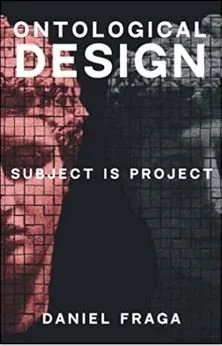Lecture 16: Daniel Frage on Ontological Design
THIS BOOK IS ABOUT DESIGNING PEOPLE.
Today, technology allows us a new form of design: one that designs subjects, not objects; people, not things. By designing the information someone consumes, we can frame their opinions. By designing the interactions they have with digital devices, we can frame their thinking. This is known by not only tech giants but by military intelligence. And now, it is time that it becomes known by designers - especially those at the vanguard of dying paradigms.
Our environments, our tools and even our ideas are extensions of ourselves. Our clothes extend our skin’s ability to keep our body warm, and our glasses improve our eye’s ability to see. This is simple enough. But what about language, or the internet? What does it do to us? How do they extend our humanity? More importantly: can we design that extension?
In this century, algorithmically powered ontological design will radically reinvent what “human” means. It will not only be used to create “better” humans, but to redesign the very concepts of “better” itself, disrupting the values of the old world order and kickstarting a struggle for the new.
Creatively terrifying designs are becoming possible. The competitive landscape of capitalism and geopolitics is slowly learning the fact that in the 21st century, reality will be competitively designed. Design and “brainwashing” won’t be too far apart as disciplines in the near future. That is precisely why it is ethical to explore even the darkest outcomes of such a craft. For freedom requires power, and power demands that we be not afraid to look it in the eye.
That is both the danger and the potential of ontological design. Wether you want to design in self-defense or to exploit, to create artistic social containers or commoditized total-worlds: this book can be your manual for designing humans at the end of the “human” era - and possibly inventing what comes next.
The unimaginable awaits.

